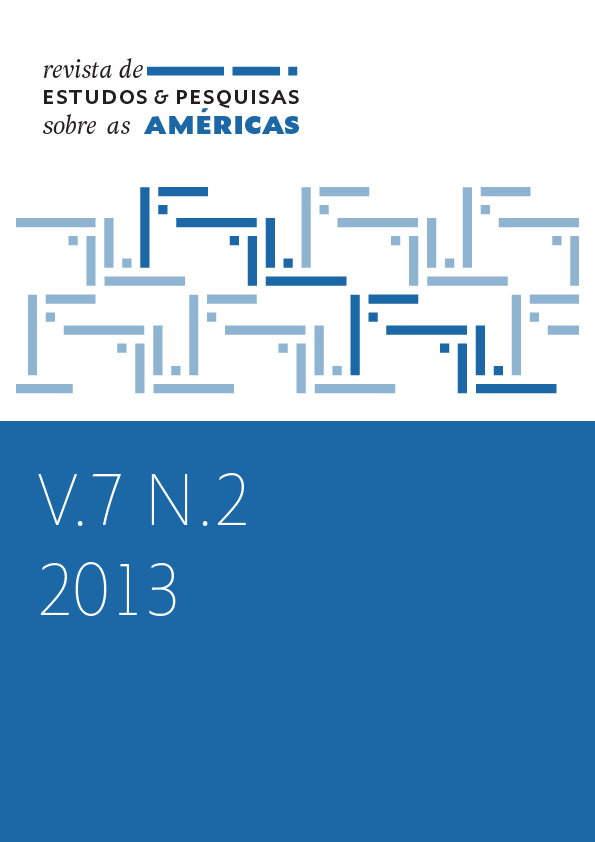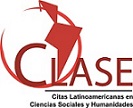Migração Infantil
o direito de crianças peruanas no Chile à reunificação familiar
Palavras-chave:
Migração infantil. Peru. Chile. Leis de proteção.Resumo
O objetivo deste artigo é analisar as formas como as crianças peruanas migrantes em Santiago, Chile, experienciam a reunificação familiar. O artigo considera as diversas maneiras pelas quais as estruturas multi-nacionais e sócio-jurídicas influenciam e, de certa forma, determinam a participação das crianças neste processo, pensando as crianças como sendo sujeitos de direitos e atores sociais. Além disso, este trabalho tem como objetivo contribuir para o debate que existe atualmente em torno do desenvolvimento de uma nova "política de imigração" no Chile. Recentemente, o governo do presidente Sebastian Piñera (2010-2014) apresentou um anteprojeto de Lei de Imigração e Nacionalidade ao Congresso para discussão e modificação. Vários instrumentos jurídicos internacionais ratificados pelo Estado chileno promovem e garantem o direito fundamental de crianças a viver com suas famílias. Tal é o caso da Convenção Internacional sobre a Proteção dos Direitos de Todos os Trabalhadores Migrantes e dos Membros de suas Famílias e da Convenção sobre os Direitos da Criança. No entanto, dada a complexidade dos processos migratórios, ocasionalmente este direito é gravemente violado por políticas migratórias (seja por restrição ou omissão), por condições de emprego precárias e habitação de famílias de migrantes, e pelas decisões dos adultos dos grupos familiares, geralmente feitas sem a opinião das crianças. Famílias migrantes, inevitavelmente, passam por fragmentações, o que afeta as relações e laços geracionais. Muitas vezes as crianças não tem o controle dos acontecimentos e das decisões que vão mudar substancialmente suas vidas.
Downloads
Referências
Committee on the Protection of the Rights of All Migrant
Workers and Members of Their Families. 2011. Consideration
of reports submitted by States parties under article 74 of the
Convention Concluding observations of the Committee on the
Protection of the Rights of All Migrant Workers and Members
of Their Families: Chile, 15th session, 12-23 September 2011.
Cortez, Ana 2004. “Integrating immigrant children Chilean school system:
barriers and challenges.” Pp. 163-172 in Children immigrants in Chile: rights and
realities, edited by Collective Without Borders. Santiago: Editorial Collective
Without Borders-Nest-KINDERNOTHILFE Foundation.
Department of Immigration and Migration. Ministry of the Interior. 2008.
“Characterization of immigration and immigration policy in Chile.” Chile.
Accessed July 31, 2010 (http://www.incami.cl/archivosUpload/caracterizacion by
ciento20e by ciento20instructivo by ciento20politica by ciento20migratoria by
ciento20septiembre by ciento202008.ppt).
Department of Immigration and Migration. Ministry of the Interior. 2009.
“Annual Report of Permits Granted and foreign population estimate in Chile
December 2009”. Chile. Retrieved July 28, 2010 (http://www.extranjeria.
gov.cl/filesapp/Informe by ciento20Estimacion by ciento20Poblacion by
ciento20Extranjeros by ciento202008.pdf).
Department of Immigration and Migration. Ministry of the Interior 2010.
“Migration Statistics. Definitive Tenure granted by the Department of
Immigration and Migration 1995-2009 period. “Chile. Retrieved July 28, 2010
(http://www.extranjeria.gov.cl/estadisticas_mig.html).
Department of Immigration and Migration. Ministry of the Interior 2010. “Migration Statistics. Temporary residence permits issued by the Department of
Immigration and Migration 2003-2009 period. “Chile. Retrieved July 28, 2010
(http://www.extranjeria.gov.cl/estadisticas_mig.html).
Dreby, Joanna. 2007. “Children and Power in Mexican Transnational Families”.
Journal of Marriage and Family, 69: 1050-1064.
Dreby, Joanna. 2010. Divided by Borders. Mexican Migrants and Their Children.
Berkley: University of California Press.
Fouron, Georges E. y Glick-Schiller, Nina. 2002. “The Generation of Identity:
Redefinif the Second Generation Within a Transnational Social Field.” Pp.
-209 en The changing face of home. The transnational lives of the second
generation, Levitt, Peggy y Waters, Mary, eds. New York: Russell Sage
Foundation,
Gaitan, Lourdes. 2008. Children as actors in the migration process. Madrid:
Universidad Complutense de Madrid.
Gregorio Gil, Carmen. 1998. Female migration. Its impact on gender relations.
Madrid: Narcea.
Hondagneu-Sotelo, Pierrette. 2001. Doméstica. Immigrant Workers Cleaning &
Caring in the Shadows of Affluence. Berkeley: University of California Press.
Lamas, Marta. 2007. “Some Reflections on the right to decide over their own
bodies.” Pp.43-51 in Gender and social cohesion, coordinated by Astelarra,
Judith. Madrid: Fundación Carolina.
Loredo, Patricia. 2004. “Children, migration and health: new challenges.” Pp.125-
in Children immigrants in Chile: rights and realities, edited by Collective
Without Borders. Santiago: Editorial Collective Without Borders-Nest-
KINDERNOTHILFE Foundation.
Levitt, Peggy. 2001. The Transnational Villagers. Berkeley y Los Angeles: University of California Press.
Mardones, Paul. 2006. “Exclusion and over-concentration of the migrant student
population under a model of socio-territorial segregation.” Contest Final Report:
Migration and development models in Latin America and the Caribbean.
Regional Scholarship Program Clacso.
Mayall, Berry. 2002. Towards a Sociology for Childhood. Thinking from children’s
lives. Glasgow: Open University Press-McGraw-Hill Education.
United Nations Organization. 1989. Convention on the Rights of the Child.
United Nations Organization. 1990. International Convention on the Protection
of the Rights of All Migrant Workers and Members of Their Families.
Parella, Sonia. 2005. “Motherhood remote Latin American domestic
workers in Spain. The violation of the right to family life in the context of
the internationalization of reproduction. “Pp.238-271 in Gender broken. On
violence, freedom and the rights of women in the new millennium, edited by
Giro, Joaquin. Madrid: Cataract,
Parella, Sonia and Cavalcanti, Leonardo. 2008. “Application of transnational
social fields in migration studies.” Pp. 217-243 in New Transnationalism
challenges in the study of migration, coordinated by Solé, Charlotte, Parella,
Sonia and Cavalcanti, Leonardo. Madrid: Permanent Immigration Observatory,
Pavez Soto, Iskra. 2010a. “The rights of girls and children Peruvian migrants in
Chile. Childhood as a new actor migration “, Journal Approaches, 12 (8): 27-51.
Pavez Soto, Iskra. 2010b. “Peruvian Girls and Boys as Actors of Family
Migration in Barcelona: Generational Relations and Expectations”, Migraciones
Internacionales, 5 (4): 69-99.
Pavez Soto, Iskra. 2011a. Child Migration: generational and gender breakdowns.
Peruvian Girls in Barcelona and Santiago de Chile. Doctoral Thesis of Sociology,
Autonomous University of Barcelona.
Pavez Soto, Iskra. 2011b. “Who decides the child migration? Children and
power in transnational Peruvian families “RAYUELA, Revista Iberoamericana on
Children and Youth in Struggle for their Rights, no. 5, p. 103-113.
Pavez Soto, Iskra, Corporación Colectivo Sin Fronteras de Chile, NGO Network
for Children and Youth of Chile and Children Clinic Law School of Central
University. (2012). Report “Observations in Relation to Migrant Children in
the Context of Advisory Opinion Requested to the Court of Human Rights”.
Available at: http://joomla.corteidh.or.cr:8080/joomla/images/stories/
Observaciones/23/23.pdf, Date accessed June 21, 2013.
Pedone, Claudia. 2003. “You always jalas to yours”. Migratory chains and
Ecuadorian families to Spain. Ph.D. dissertation, Department of Geography,
Barcelona: Universitat Autònoma de Barcelona.
Pedone, Claudia. 2006. “The family and educational changes in current
Ecuadorian migration contexts: A transatlantic perspective” Athena Digital, 10:
-171.
Pedone, Claudia. 2010. “Introduction. Beyond stereotypes: challenges around the
study of migrant families. “Pp. 11-16, in Families, children and young migrants.
Breaking stereotypes, coordinated by the Interdisciplinary Research Group @ s
Migrants. Madrid: IEPALA.
Salazar Parreñas, Rhacel. 2001). Servants of Globalization. Women, migration and
domestic work. Stanford: Standford University Press.
Salazar Parreñas, Rhacel. (2003). “The Care Crisis in the Philippines: Children and
Transntional Families in the Global Economy”. En: Ehrenreich, Barbara y Russell
Hochschild, Arlie. (Eds.). Global Woman: Nannies, maids and Sex Workers in the
New Economy. London: Granta Books, p. 39-54.
Solé, Charlotte, Parella, Sonia and Calvancanti, Leonardo. 2007. The
transnational financial and family ties: Ecuadorian and Peruvian immigrants in
Spain. Madrid: BBVA.
Stefoni, SC 2004. “Immigration and Citizenship: Peruvian community formation
in Santiago and the emergence of new citizens.” Politics 43:319-336.
Stefoni, Carolina. 2002. “Women Peruvian immigrants in Chile”, Journal of
Population, 33: 118-145.
Stefoni, Carolina. 2009. “Migration, Gender and domestic service. Peruvian
women in Chile. “Pp. 191-232 in: Domestic Work: a long way to decent work,
edited by Valenzuela, María Elena and Mora, Claudia. Santiago: International
Labour Office,
Stefoni, Carolina, Elaine Acosta, Marcia Gaymer and Francisca Casas-Cordero.
Immigrant children in Santiago, Chile. Between integration and exclusion.
Santiago: IOM-Universidad Alberto Hurtado.
Migration and Intercultural Network, REDMI. 2011. Matrix diagnosis and
proposed solutions, Santiago de Chile, unpublished.
Suarez-Orozco, Carola and Marcelo Suarez-Orozco. 2003. The children of
immigrants. Madrid: Morata.
Suárez-Orozco, Carola y Marcelo Suárez-Orozco 2008. Históries d’immigració: la
comprensió dels patrons de rendiment escolar dels joves immigrants nouvinguts.
Serie: Informes Breus Nº 12 Immigració. Barcelona: Fundació Jaume Bofill.
Van Dijk, Teun. 2003. Racism discourse in Spain and Latin America. Barcelona:
Gedisa.
Vasquez, Maria Elena. 2004. “Children immigrants. Background. “Pp. 93-
in Children immigrants in Chile: rights and realities, edited by Collective
Without Borders. Santiago: Editorial Collective Without Borders-Nest-
KINDERNOTHILFE Foundation.
Downloads
Publicado
Como Citar
Edição
Seção
Licença
a. Autores mantém os direitos autorais e concedem à revista o direito de primeira publicação, com o trabalho simultaneamente licenciado sob a Licença Creative Commons Attribution que permite o compartilhamento do trabalho com reconhecimento da autoria e publicação inicial nesta revista.
b. Autores têm autorização para assumir contratos adicionais separadamente, para distribuição não-exclusiva da versão do trabalho publicada nesta revista (ex.: publicar em repositório institucional ou como capítulo de livro), com reconhecimento de autoria e publicação inicial nesta revista.
c. Autores têm permissão e são estimulados a publicar e distribuir seu trabalho online (ex.: em repositórios institucionais ou na sua página pessoal) visando aumentar o impacto e a citação do trabalho publicado (Veja O Efeito do Acesso Livre).
d. Ao ter seu trabalho aprovado e publicado, o autor compromete-se a colaborar com os processos de avaliação de outros trabalhos, em conformidade com sua disponibilidade e área de atuação.
















